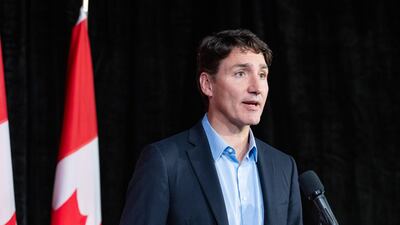Prime Minister Justin Trudeau said on Monday that Canada will impose a 100 per cent tariff on imported Chinese electric vehicles, following the US announcing more tariffs in the spring.
Ottawa will also impose a 25 per cent tariff on steel and aluminium imported from China, Mr Trudeau told reporters in Halifax, Nova Scotia. The tariffs will be imposed starting October 1 this year, Reuters reported.
The tariffs come a little more than a month after Ottawa opened a 30-day public consultation on Chinese EVs and related products, bringing it in line with the US and the EU.
“I think we all know that China is not playing by the same rules,” Mr Trudeau said. “What is important about this is we're doing it in alignment and in parallel with other economies around the world.”
Ottawa is trying to position Canada as a critical part of the global EV supply chain and has come under pressure domestically to act against China.
Canada has signed deals worth billions of dollars to bring in top European car makers in all parts of the EV supply chain to bolster its manufacturing heartland.
The US is expected to announce final implementation plans this week for steep tariff increases announced by President Joe Biden earlier this year. However, the planned duties might be softened.
Mr Biden in May announced major new tariffs on Chinese EVs, advanced batteries, solar cells, steel, aluminium and medical equipment.
He has said government subsidies for EVs and other consumer goods ensure that Chinese companies do not have to turn a profit, giving them an unfair advantage in global trade.
Ottawa's announcement followed encouragement from US National Security Adviser Jake Sullivan during a meeting with Mr Trudeau and cabinet ministers on Sunday. Mr Sullivan is set to make his first visit to Beijing on Tuesday.
“We’re doing it in alignment, in parallel, with other economies around the world that recognise that this is a challenge that we are all facing,” Mr Trudeau said of the new tariffs.
There was no immediate response from China.
Chinese firms can sell EVs for as little as $12,000. China’s solar cell plants and steel and aluminium mills have enough capacity to meet much of the world’s demand.
“Actors like China have chosen to give themselves an unfair advantage in the global marketplace,” Mr Trudeau said.
Chinese officials argue their production keeps prices low and would aid a transition to the green economy.
The only Chinese-made EVs currently imported into Canada are from Tesla, made at the company’s Shanghai factory.
Canada “had to go with the US position, when you think about the economic integration that we have with the US”, former Canadian ambassador to China Guy Saint-Jacques told the Associated Press.
“More than 75 per cent of our exports go to the US. This reflects the fear that the next president of the United States might be Donald Trump, and so they know we have to be pretty much aligned in all of this.”
Mr Saint-Jacques said Canada can expect retaliation from China in other industries, adding that barley and pork are candidates because Beijing can get them from other countries.
“China will want to send a message,” he said.






